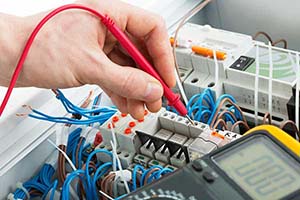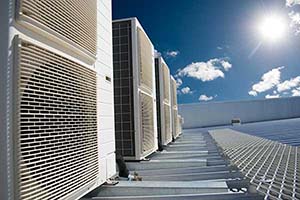Contractors License Overview
- Virtually every aspect of Commercial, Residential, Plumbing, HVAC, Electrical and Public Works construction is regulated at the State Level.
- Pre-Approval is required for all classifications before testing.
- Additional licensing requirements including experience, financial requirements, exam information, reference books needed, reciprocity and Continuing Education Requirements, please select the appropriate License link below.

North Carolina Residential
North Carolina Residential Building Contractor
The Residential classification covers all types of construction activity pertaining to the construction of residential units that are required to conform to the residential code adopted by the Building Code Council. It covers all site-work, driveways and sidewalks ancillary to the residential structure and the work done as part of such residential units under the specialty classifications of Insulation, Masonry, and Swimming Pools.
North Carolina Commercial
North Carolina General Building Contractor
The General Building classification covers all types of construction activity including but not limited to commercial, industrial, institutional, and all types of residential building construction. This covers parking decks, all site-work, grading and paving of parking lots, driveways, sidewalks, curbs and gutters which are ancillary to this type of construction. It also covers work done under the specialty classifications of Concrete construction, Insulation, Interior construction, Masonry construction, Roofing, Metal Erection, and Swimming Pools.
North Carolina Interior Construction
We offer custom training options for the North Carolina Interior Construction training built around your schedule. Find out now what options we have available.
Explore Custom Training TodayThe Interior classification allows the installation of acoustical ceiling systems and panels, drywall portions (load bearing and nonbearing), lathing and plastering, flooring and finishing, interior recreational surfaces, window and door installation, and installation of fixtures, cabinets, and millwork. It also includes removal of asbestos and replacement with non-toxic substances.
North Carolina Masonry Construction
We offer custom training options for the North Carolina Masonry Construction training built around your schedule. Find out now what options we have available.
Explore Custom Training TodayThe Masonry classification covers the installation, with or without the use of mortar or adhesives, of brick, concrete block, gypsum partition tile, pumice block or other lightweight and facsimile units and products common to the masonry industry, fire clay products and refractory construction, rough cut and dressed stone, marble panels, slate units, installation of structural glazed tile or block, glass brick or block, and solar screen tile or block.
North Carolina Metal Erection
We offer custom training options for the North Carolina Metal Erection training built around your schedule. Find out now what options we have available.
Explore Custom Training TodayThe Metal Erection classification covers the field fabrication, erection, repair, and alteration of architectural and structural shapes, plates, tubing, pipes and bars not limited to steel or aluminum, that are or may be used as structural members for buildings, equipment, and structures, covers the layout, assembly, and erection by welding, bolting, or riveting such metal products as, but not limited to curtain walls, tanks of all types, hoppers, structural members for buildings, towers, stairs, conveyor frames, cranes and crane runways, canopies, carports, guard rails, signs, steel scaffolding as a permanent structure, rigging, flagpoles, fences, steel and aluminum siding, bleachers, fire escapes, and the seating for stadiums, arenas, and auditoriums.
North Carolina Electrical
North Carolina Electrcial Restricted-Elevators (SP-EL)
We offer custom training options for the North Carolina Electrcial Restricted-Elevators (SP-EL) training built around your schedule. Find out now what options we have available.
Explore Custom Training TodayThe Electrical Specialty Restricted Elevator (SP-EL) classification covers installing, maintaining, or repairing electrical wiring only as an incident to the licensee’s elevator dumbwaiter, escalator, moving walk, or personnel hoist business. Furthermore, the license authorizes the licensee to install, maintain, or repair only electric wiring that is an integral part of an elevator, dumbwaiter, escalator, moving walk, or personnel hoist, or is electrically isolated from the building wiring by a safety switch or circuit breaker that has been installed complete with line-side connections by others, and originates at the load-side terminals of the protective isolating device (referred to as “beyond the disconnection means.)
North Carolina Electrical
The Electrical classification covers installing, maintaining, altering, or repairing of any electrical work, wiring, devices, appliances, or equipment. It covers both residential and commercial work and is not limited in scope.
North Carolina Electrical-Ahead of Point of Delivery
We offer custom training options for the North Carolina Electrical-Ahead of Point of Delivery training built around your schedule. Find out now what options we have available.
Explore Custom Training TodayThe Electrical – Ahead of Point Delivery classification covers the construction, installation, alteration, maintenance, or repair of an electrical wiring system, including sub-stations or components thereof, which is or is intended to be owned, operated, and maintained by an electric power supplier such as a public or private utility, a utility cooperative, or any other properly franchised electric power supplier, for the purpose of furnishing electrical services to one or more customers.
North Carolina Electrical Restricted-Electrical Signs (SP-ES)
We offer custom training options for the North Carolina Electrical Restricted-Electrical Signs (SP-ES) training built around your schedule. Find out now what options we have available.
Explore Custom Training TodayThe Electrical Specialty Restricted Electric Sign (SP-ES) classification allows the licensee to install, maintain, or repair electrical wiring or devices only as an incident to the licensee’s electric sign business. Furthermore, the license authorizes the licensee to install, maintain, or repair only wiring that is directly related to electric signs and is electrically isolated from the building wiring system. Wiring that is directly related differs depending on the type of sign involved.
North Carolina Electrical Restricted-Fire Alarm -Low Voltage (SP-FA/LV)
We offer custom training options for the North Carolina Electrical Restricted-Fire Alarm -Low Voltage (SP-FA/LV) training built around your schedule. Find out now what options we have available.
Explore Custom Training TodayThe Electrical Specialty Restricted Low Voltage (SP-LV) classification covers installing, maintaining, or repairing only low voltage wiring and directly related wiring. Wiring is considered directly related if it originates at the load-side terminals of a disconnecting means or junction box that has been installed complete with line-side connections by others for the specific purpose of supplying the low voltage wiring system involved and is permanently and legibly marked to identify the low voltage wiring system supplied and is not installed in a location considered as hazardous under the National Electrical Code.
North Carolina Electrical Restricted-Ground Water Pumps (SP-WP)
We offer custom training options for the North Carolina Electrical Restricted-Ground Water Pumps (SP-WP) training built around your schedule. Find out now what options we have available.
Explore Custom Training TodayThe Electrical Specialty Restricted Ground Water Pump (SP-WP) classification allows the licensee to install, maintain, or repair electrical wiring only as an incident to the licensee’s ground water pump business. It authorizes the licensee to install, maintain, or repair only wiring that is directly related to a ground water pump and that is restricted to circuits or part of circuits that operate at voltages not exceeding 600 volts phase–to-phase, is electrically isolated from the building wiring system by an over-current protective isolating device that has been installed complete with line-side connections by others, permanently and legibly marked to identify the equipment served by the device, and is located adjacent to the controller for the specific ground water pump equipment involved and within an enclosure intended solely for and limited to serving that equipment. Also, it authorizes the licensee to install, maintain, or repair only wiring that is directly related to a ground water pump and that originates at the load-side terminals of the protective isolating device and is not installed in a location considered as hazardous under the National Electrical Code.
North Carolina Electrical Restricted-Plumbing and Heating (SP-PH)
We offer custom training options for the North Carolina Electrical Restricted-Plumbing and Heating (SP-PH) training built around your schedule. Find out now what options we have available.
Explore Custom Training TodayThe Electrical Specialty Restricted Plumbing, Heating, and Air Conditioning (SP-PH) classification authorizes the licensee to install, maintain, or repair electric wiring or devices only as an incident to the licensee’s plumbing, heating, or air conditioning business.
It authorizes the licensee to install, maintain, or repair only wiring that is directly related to pluming, heating, or air conditioning that is restricted to circuits or parts of circuits that operate at voltages not exceeding 600 volts phase to phase, is electrically isolated from the building wiring system by an over-current protective isolating device that has been installed complete with line-side connections by others, is permanently and legibly marked to identify the equipment served by the device and is located within an enclosure intended solely for and limited to servicing the specific plumbing, heating, or air conditioning equipment involved or is located within a panel-board that serves the building wiring system and is also permanently and legibly marked to identify the equipment served by the devise provided that the wiring is installed by others from the load side terminals of the device to the junction box, auxiliary gutter, or similar disconnecting means located outside the panel-board but in sight of and within 50 feet of the plumbing, heating, or air conditioning equipment served.
This license also authorizes the licensee to install, maintain, or repair only wiring that is directly related to plumbing, heating, or air conditioning equipment and that originates at the load side terminals of the protective isolating device, except for control wiring, is physically adjacent to the plumbing, heating, or air conditioning equipment. Control wiring that receives its control power from the plumbing, heating, or air conditioning equipment involved may extend beyond these limits if the control voltage does not exceed 120 volts to ground and the wiring is protected from over-current and is not installed in a location considered hazardous under the National Electrical Code.
North Carolina Electrical Restricted-Single Family Dwelling (SP-SFD)
We offer custom training options for the North Carolina Electrical Restricted-Single Family Dwelling (SP-SFD) training built around your schedule. Find out now what options we have available.
Explore Custom Training TodayThe Electrical Specialty Restricted Single Family Dwelling (SP-SFD) classification allows the licensee to install, maintain, or repair only electrical wiring and devices that are in or on a single family residential dwelling or an ancillary to a single family residential dwelling. Electrical work which is covered by another special restricted license can be performed by a specialty restricted single family dwelling licensee without obtaining the other special restricted license as long as it is in or on a single family residential dwelling or an ancillary to a single family residential dwelling.
North Carolina Electrical Restricted-Swimming Pools (SP-SP)
We offer custom training options for the North Carolina Electrical Restricted-Swimming Pools (SP-SP) training built around your schedule. Find out now what options we have available.
Explore Custom Training TodayThe Electrical Specialty Restricted Swimming Pool (SP-SP) classification allows the licensee to install, maintain, or repair swimming pool bonding work only as an incident to the licensee’s business of installing, maintaining, or repairing swimming pools. Furthermore, this license authorizes the licensee to perform only the bonding together of all metal parts of the pool structure including the reinforcing metal of the pool shell, coping stones, and deck, all form shells, all metal fittings within or attached to the pools structure, all metal conduit, metal piping, and fixed metal parts on or near a swimming pool installation.
It also authorizes the licensee to perform only the installation of a common bonding grid (bonding together of all parts listed here previously), installation of the forming shells for lighting fixtures and underwater audio equipment, installation of the conduits extending from the lighting fixture and audio equipment forming shells to deck or junction boxes and the installation of the deck or junction boxes, installation of the lighting fixtures and audio equipment in their respective forming shells from the forming shells to the deck or junction boxes leaving appropriate leads in the deck or junction boxes to which the circuit conductors can be connected by others, and installation of a bonding conductor form the point of its connection to the common bonding grid to a readily accessible point at the circulating pump location.
North Carolina NASCLA
NASCLA offers a single exam to become licensed in 15 states. For more information click here.
Oregon - Nevada - Arizona - Utah - Louisiana - Florida - Arkansas - Alabama - Mississippi - Georgia - South Carolina - North Carolina - Virginia - Tennessee
NASCLA Commercial General Building Contractor
The NASCLA Accredited Commercial General Building Contractor Exam eliminates the trade examination only for the participating state agencies. Once you have passed an exam within the NASCLA Accredited Examination Program, contractors will still have to meet additional state licensure requirements within each participating state to obtain their license, as well as passing the state specific Business Law exam.
North Carolina HVAC and Mechanical
North Carolina Fuel Distribution
We offer custom training options for the North Carolina Fuel Distribution training built around your schedule. Find out now what options we have available.
Explore Custom Training TodayThe Fuel Distribution classification covers the construction, installation, alteration, maintenance, or repair of systems for distribution of petroleum fuels, petroleum distillates, natural gas, chemicals, and slurries through a pipeline from 1 station to another. It includes all excavation, trenching, and backfilling in connection therewith. It covers the installation, replacement, and removal of above ground and below ground fuel storage tanks.
North Carolina Heating Contractor Group 1, Class 1
We offer custom training options for the North Carolina Heating Contractor Group 1, Class 1 training built around your schedule. Find out now what options we have available.
Explore Custom Training TodayThe Heating Group 1, Class 1 classification covers the heating system of a building which requires the use of high pressure or low pressure steam, vapor, or hot water including all piping, ducts, and mechanical equipment appurtenant thereto with, adjacent to, or connected with a building for comfort heating. Class 1 contractors may do this work in residential, commercial, industrial, and institutional buildings.
North Carolina Heating Contractor Group 1, Class 2
We offer custom training options for the North Carolina Heating Contractor Group 1, Class 2 training built around your schedule. Find out now what options we have available.
Explore Custom Training TodayThe Heating Group 1, Class 2 classification covers the heating system of a building which requires the use of high pressure or low pressure steam, vapor, or hot water including all piping, ducts, and mechanical equipment appurtenant thereto with, adjacent to, or connected with a building for comfort heating. Class 2 contractors may do this work in single family detached residential buildings only.
North Carolina Heating Contractor Group 3, Class 1 (Residential/Commercial)
We offer custom training options for the North Carolina Heating Contractor Group 3, Class 1 (Residential/Commercial) training built around your schedule. Find out now what options we have available.
Explore Custom Training TodayThe Heating Group 3, Class 1 classification covers the heating system of a building which produces heat to raise the temperature of the space within the building for the purpose of comfort in which electric heating elements or products of combustion exchange heat either directly with the building supply air or indirectly through a heat exchanger and using an air distribution system of ducts. This license also covers air conditioning units of 15 tons or less. Class 1 contractors may do this work in residential, commercial, industrial, or institutional buildings.
North Carolina Heating Contractor Group 3, Class 2 (Residential)
We offer custom training options for the North Carolina Heating Contractor Group 3, Class 2 (Residential) training built around your schedule. Find out now what options we have available.
Explore Custom Training TodayThe Heating Group 3, Class 2 classification covers the heating system of a building which produces heat to raise the temperature of the space within the building for the purpose of comfort in which electric heating elements or products of combustion exchange heat either directly with the building supply air or indirectly through a heat exchanger and using an air distribution system of ducts. This license also covers air conditioning units of 15 tons or less. Class 2 contractors may do this work in single family detached residential buildings only.
North Carolina Heating Group 2 ( Air Conditioning)
We offer custom training options for the North Carolina Heating Group 2 ( Air Conditioning) training built around your schedule. Find out now what options we have available.
Explore Custom Training TodayThe Heating Group 2 classification covers air conditioning systems that consist of interacting components producing conditioned air for comfort cooling by lowering the temperature, having a mechanical refrigeration capacity in excess of 15 tons, and circulating the air. Systems installed in single family residences are included under Heating Group 3, regardless of size.
North Carolina Plumbing
North Carolina Plumbing Contractor , Class 1 (Residential/Commercial)
We offer custom training options for the North Carolina Plumbing Contractor , Class 1 (Residential/Commercial) training built around your schedule. Find out now what options we have available.
Explore Custom Training TodayThe Plumbing Class 1 classification covers the system of pipes, fixtures, apparatus and appurtenances installed upon the premises or in a building to supply water to and to convey sewage or other waste from the premises or building. The Plumbing Class 1 contractor may do this work in commercial, residential, industrial, and institutional buildings.
North Carolina Plumbing Contractor, Class 2 (Residential)
We offer custom training options for the North Carolina Plumbing Contractor, Class 2 (Residential) training built around your schedule. Find out now what options we have available.
Explore Custom Training TodayThe Plumbing Class 2 classification covers the system of pipes, fixtures, apparatus, and appurtenances installed upon the premises or in a building to supply water to and to convey sewage or other waste from the premises or building. The Plumbing Class 2 contractor may do this work in single family detached residential dwellings only.
North Carolina Plumbing Technicican
We offer custom training options for the North Carolina Plumbing Technicican training built around your schedule. Find out now what options we have available.
Explore Custom Training Today(Plumbing) Technician: Potable water and drain/waste/vent piping systems. Must be a sub-licensee of a licensed plumbing contractor. This is not a contracting license.
North Carolina Specialty Trades
North Carolina Asbestos
We offer custom training options for the North Carolina Asbestos training built around your schedule. Find out now what options we have available.
Explore Custom Training TodayThe Asbestos classification allows renovation or demolition activities involving the repair, maintenance, removal, isolation, encapsulation, or enclosure of Regulated Asbestos Containing Materials (RACM) for any commercial, industrial, or institutional building, whether public or private. It also covers all types of residential building construction involving RACM during renovation and/or demolition.
North Carolina Boring & Tunneling
We offer custom training options for the North Carolina Boring & Tunneling training built around your schedule. Find out now what options we have available.
Explore Custom Training TodayThe Boring and Tunneling classification covers the construction of underground or underwater passageways by digging or boring through and under the earth’s surface, including the bracing and compacting of such passageways to make them safe for the purpose intended. This classification also includes the preparation of the ground surfaces at points of ingress and egress.
North Carolina Communications
We offer custom training options for the North Carolina Communications training built around your schedule. Find out now what options we have available.
Explore Custom Training TodayThe Communications classification covers the installation of all types of pole lines and aerial and underground distribution cable for telephone systems, aerial and underground distribution cable for cable TV and master antenna TV systems capable of transmitting RF signals, underground conduit and communication cable including fiber optic cable, microwave systems and towers including foundations and excavations where required when microwave systems are being used for the purpose of transmitting RF signals, and installation of PCS or cellular telephone towers and sites.
North Carolina Concrete
We offer custom training options for the North Carolina Concrete training built around your schedule. Find out now what options we have available.
Explore Custom Training TodayThe Concrete classification covers the construction and installation of foundations, pre-cast silos and other concrete tanks or receptacles, pre-stressed components, and gunite applications but EXCLUDES bridges, streets, sidewalks, curbs, gutters, driveways, parking lots, and highways.
North Carolina Fuel Piping Contractor
We offer custom training options for the North Carolina Fuel Piping Contractor training built around your schedule. Find out now what options we have available.
Explore Custom Training TodayThe Fuel Piping classification covers persons who do not possess the required Class 1 or Class 2 plumbing or heating license but wish to engage in the contracting or installing of fuel piping extending from an approved fuel source at or near the premises, which piping is used in part or entirely to supply fuel to plumbing or heating systems or equipment for which, by its installation, may alter or affect the fuel supply to plumbing or heating of equipment.
North Carolina Grading and Excavating
We offer custom training options for the North Carolina Grading and Excavating training built around your schedule. Find out now what options we have available.
Explore Custom Training TodayThe Grading and Excavation classification covers digging, moving and placing of materials forming the surface of the earth (excluding air and water) in such a manner that the cut, fill, excavation, grade, trench, backfill, or any similar operation can be executed with the use of hand and power tools and machines commonly used for these types of digging, moving, and material placing. It covers work on earthen dams and the use of explosives used in connection with all or any part of the activities described in this outline. It also covers clearing, grubbing, and erosion control activities.
North Carolina Highway Contractor
We offer custom training options for the North Carolina Highway Contractor training built around your schedule. Find out now what options we have available.
Explore Custom Training TodayThe Highway classification covers all types of highway construction activity including but not limited to: grading, paving of all types, installation of exterior artificial athletic surfaces, relocation of public and private utility lines ancillary to the principal project, bridge construction and repair, parking decks, sidewalks, curbs, gutters and storm drainage.
It includes installation and erection of guard rails, fencing, signage and ancillary highway hardware. It covers paving and grading of airport and airfield runways, taxiways, and aprons including the installation of signage, runway lighting and marking. The license also covers work done under the specialty classifications of Boring and Tunneling, Concrete, Marine, and Railroad construction.
North Carolina Insulation
We offer custom training options for the North Carolina Insulation training built around your schedule. Find out now what options we have available.
Explore Custom Training TodayThe Insulation classification allows the installation, alteration, or repair of materials classified as insulating media used for the non-mechanical control of temperatures in the construction of residential and commercial buildings. It does not include the insulation of mechanical equipment and ancillary lines and piping.
North Carolina Marine Construction
We offer custom training options for the North Carolina Marine Construction training built around your schedule. Find out now what options we have available.
Explore Custom Training TodayThe Marine classification allows all marine construction and repair activities and all types of marine construction in deep water installations and in harbors, inlets, sounds, bays, and channels. It covers dredging, construction and installation of pilings, piers, decks, slips, docks, and bulkheads. It does not include structures required on docks, slips, and piers.
North Carolina Public Utilities Contractor
We offer custom training options for the North Carolina Public Utilities Contractor training built around your schedule. Find out now what options we have available.
Explore Custom Training TodayThe Public Utilities classification covers work done under the specialty classifications of Boring and Tunneling, Communications, Fuel Distribution, Electrical – Ahead of Point of Delivery, Swimming Pools, Water Lines and Sewer Lines, and Water Purification and Sewage Disposal. It also includes the performance of construction work on water and waste-water systems.
North Carolina Railroad Construction
We offer custom training options for the North Carolina Railroad Construction training built around your schedule. Find out now what options we have available.
Explore Custom Training TodayThe Railroad classification covers the building, construction, and repair of railroad lines including clearing and filling rights-of-way, shaping, compacting, setting and stabilizing road beds, setting ties, tie plate rails, rail connectors, frogs, switch plates, switches, signal markers, retaining walls, dikes, fences and gates, and construction and repair of tool sheds and platforms.
North Carolina Roofing
We offer custom training options for the North Carolina Roofing training built around your schedule. Find out now what options we have available.
Explore Custom Training TodayThe Roofing classification covers the installation and repair of roofs and decks on residential, commercial, industrial, and institutional structures requiring materials that form a watertight and weather-resistant surface. For the purposes of this definition “material†includes cedar, cement, asbestos, clay tile, composition shingles, all types of metal coverings, wood shakes, single ply and built-up roofing, protective and reflective roof and deck coatings, sheet metal valleys, flashings, gravel stops, gutters and downspouts, and bituminous waterproofing among other things.
North Carolina Swimming Pools
We offer custom training options for the North Carolina Swimming Pools training built around your schedule. Find out now what options we have available.
Explore Custom Training TodayThe Swimming Pool classification covers the construction, service, and repair of all swimming pools. It includes the excavation and grading, construction of concrete, gunite, and plastic-type pools, pool decks and walkways, tiling, and coping, the installation of all equipment including pumps, filters, and chemical feeders. It does not include direct connections to a sanitary sewer system or to potable water lines, nor the grounding and bonding of any metal surfaces or the making of any electrical connections.
North Carolina Water Lines & Sewer Lines
We offer custom training options for the North Carolina Water Lines & Sewer Lines training built around your schedule. Find out now what options we have available.
Explore Custom Training TodayThe Water Lines and Sewer Lines classification covers construction work on water and sewer mains, water service lines, and house and building sewer lines as defined in the North Carolina State Building Code, water storage tanks, lift stations, pumping stations, and appurtenances to water storage tanks, lift stations, and pumping stations. It also includes pavement patching, backfill, and erosion control as part of such construction.
North Carolina Water Purification & Sewage Disposal
We offer custom training options for the North Carolina Water Purification & Sewage Disposal training built around your schedule. Find out now what options we have available.
Explore Custom Training TodayThe Water Purification and Sewage Disposal classification covers the performance of construction work on septic systems, water and wastewater treatment facilities and covers all site-work, grading, and paving of parking lots, driveways, sidewalks, and curbs and gutters that are ancillary to such construction of water and wastewater treatment facilities. It covers the work done under the specialty classifications of Concrete, Insulation, Interior construction, Masonry, Roofing, and Metal Erection as part of the work on water and wastewater treatment facilities also.







